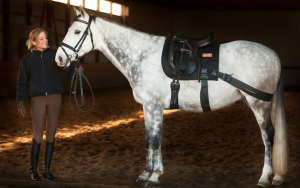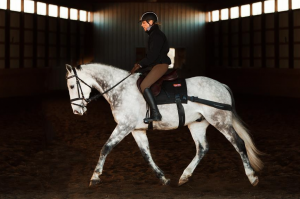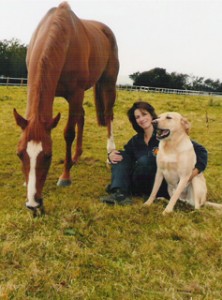Equiband

Helen is a former distributor for the Equicore Concepts Equiband System. (www.equicoreconcepts.com)


Helen is a former distributor for the Equicore Concepts Equiband System. (www.equicoreconcepts.com)

Physiotherapy is as applicable to animals as to humans. Physiotherapy is useful for a wide range of issues across a spectrum from recovery from injury to basic maintenance of normal range of motion.
Veterinary Physiotherapist Helen offers physiotherapy for all animals – from horses and other large farm animals to small animals and pets.
The phrase “physiotherapy” includes manual therapies such as McTimoney animal manipulation, mobilisation, and massage; electrotherapies including laser, ultrasound, interferential and tens; and exercise and rehabilitation strategies designed to help the animal’s ongoing recovery and strength.
Veterinary Physiotherapy
Helen is a former Head Girl of a 45-horse mixed livery yard and has been involved with horses for 30 years in various capacities, including instructing.
Following up a long term personal interest in equine physical therapy and rehabilitation, Helen qualified as a human sports massage therapist in 1998 and ran her own busy private clinic for human remedial massage clients for two years. She then undertook the ITEC Diploma in Equine Sports Massage, delivered by eminent Veterinary Chartered Physiotherapist Mary Bromiley, FCSP, graduating with Credit. Helen gained valuable experience as an equine sports massage therapist working with a wide variety of horses & riders including many top level dressage horses further to completing an MSc in Animal Manipulation from the McTimoney College (in conjunction with the University of Wales).
After several years of practice, Helen gained a further Masters Degree, this time in Veterinary Physiotherapy; graduating with Merit from Harper Adams University.
Research Interests
Helen has completed two research theses:
An investigation in to the effect of topical applications on horn moisture levels and growth rate
(Undergraduate, University of Hertfordshire)
The effect of a prescribed programme of unridden dynamic suppling exercise on range of motion of the hock joint and hindlimb stride length in the riding horse
(Postgraduate, University of Wales)
Further details of either are available on request.
Helen was recently featured on BBC Spotlight and in the Western Morning News; read the article here.
Sponsorship
Helen sponsors Rosanna Walters-Symons, FEI World Advanced Pony Silver medallist of 2013 with Dabernon Tiger Woods.
From April 2015 Helen is very pleased to be sponsoring popular Devon event rider Tim Cheffings. Tim has been a valuable client for several years and details of his very promising eventing career, horses, coaching and the Downe Farm Event Centre can be found at http://www.downefarm.com/
Horses are asked to perform in many ways. Neck, back and muscular pain may result from even day to day activities. If any of the following apply to your horse, he might benefit from treatment by an experienced equine physio :
•Unexplained poor or reduced performance
•Napping, rearing, bucking or similar resistances
•Unexplained behavioural changes, unwillingness to co-operate
•Difficulty with canter leads, poor engagement, collection or extension
•Problems when jumping: refusals, knocking poles, short strides, jumping flat
•Appearing sensitive to grooming or cold backed on mounting
•Signs of stiffness or difficulty with lateral flexion (bending)
•Difficulty with shoeing or uneven shoe wear
•Unlevelness, especially behind
•Toe-dragging
These problems may be caused by (amongst other things):
•Poor fitting tack
•Becoming cast in the stable
•Poor foot balance
•Dental pain
•Conformation problems
•Imbalanced rider
•Repetitive training
•Slips and falls whilst turned out, in competition or general work
•Old injuries – even those which we think they have recovered from
Treatments for horses take place at the horse’s usual location. It is preferable for your horse to be clean and dry in readiness for treatment. Before treatment, Helen will undertake a full static assessment and dynamic gait analysis, and may need to see the horse ridden or lunged.
The treatment is only the beginning of the healing process and a careful aftercare programme will be devised which should be followed to gain maximum benefit from treatment.
Owners will be given a written report of the findings, therapy undertaken and aftercare recommendations, including “homework” exercises, to enable them to best support the treatment which has been given and continue the rehabilitative process. It may be necessary to follow up the initial treatment with one or two more sessions but generally Helen’s aim is to produce a long-term improvement in the horse which should result in only a 6-monthly or annual maintenance check-up being required.
 “ Physiotherapy for animals …
“ Physiotherapy for animals …Helen covers Devon, North Cornwall and West Somerset.
It is a legal requirement that anyone treating an animal must have veterinary permission to do so. Helen will contact your vet prior to treatment to confirm any relevant details and to ensure permission is forthcoming. Where an animal presents with symptoms which may require veterinary attention (such as lameness), Helen may decline to proceed with treatment until veterinary advice has been sought.
Physiotherapy for animals